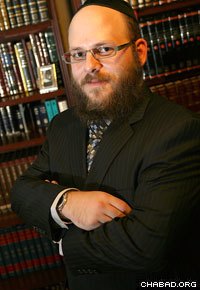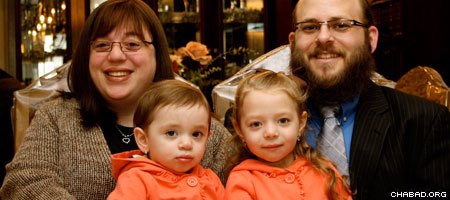Chabad-Lubavitch rabbis serve Jewish communities from Azerbaijan to Vietnam, and if Menachem M. Stern wins his case against the U.S. Army, they may also soon serve in uniform.
Stern, a 29-year-old rabbi living in Brooklyn, N.Y., was appointed as an Army Reserve first lieutenant and chaplain in September 2009, but the Army, citing an administrative error and his full beard, rescinded the offer the following day.
According to Army grooming policy, beyond “neatly trimmed mustaches,” soldiers must enter service clean-shaven. Since the rescinding of Stern’s appointment, however, three Sikh personnel and one Muslim received individual waivers to keep their beards.
Stern has the backing of the Aleph Institute, a Chabad-Lubavitch organization that assists Jewish military personnel and prisoners, and Sens. Charles E. Schumer, Kristen Gillibrand and Joseph Lieberman, all of whom unsuccessfully sought to persuade top brass that the rabbi should be able to keep his beard. They cited the case of Col. Jacob Goldstein, a bearded Chabad-Lubavitch rabbi and Army Reserve chaplain who has served with distinction in the reserves and National Guard on numerous international combat missions over the past 33 years.
When Stern was ultimately unable to secure the same exemption that Goldstein received years ago, he filed a federal lawsuit in December accusing the Army of violating his Constitutional rights to religious freedom and equal protection under the law.
“I was ready to go anywhere in the world, and this [job] literally spoke to me,” Stern, a trained EMT, said of Aleph’s online advertisement that led him to try to join the Army in the summer of 2008. “I have a great appreciation for public servants.”
According to Rabbi Sanford L. Dresin, a retired Army chaplain who directs military programs for Aleph, admittance into the chaplaincy is a two-prong process. Candidates must first be approved by an ecclesiastical endorsement agency like Aleph, screened by the military and then deemed fit for service. Stern impressed Dresin during the interview process and Aleph quickly endorsed him.
“I think he’s a very thoughtful and meticulous individual and committed to outreach in uniform,” said Dresin.
Stern submitted his application packet to the Army in January 2009 and was accepted for a reserve commission the following June. His application packet included a request for a religious exemption to the no-beard rule.
Dresin noted that the Army grants similar waivers for medical and tactical reasons. Special Forces units now stationed in Afghanistan, he said, wear beards to blend in with the locals.
Yet Army policy dictates that men wearing beards for religious reasons must enter service clean-shaven and then apply for a beard waiver. As Army spokesman George Wright explained: “The Army does allow variance for grooming standards on a case-by-case basis for religious accommodation, once soldiers go on active duty.”

That inconsistency outrages Stern.
“It’s mind-boggling,” he said. “Basically, they’re telling me to be a hypocrite.”
Wright added that two Sikhs and a Muslim who were granted waivers applied while on active duty. A third Sikh, he said, was granted a special beard exemption because of his valuable language skills. (The soldier speaks Hindi and Punjabi.)
Dresin said a severe gap in spiritual leadership prevents Jewish soldiers from exercising their free right to religion.
“Currently, there are only nine Army rabbis on active duty throughout the world,” he explained, “and about 37 Jewish chaplains in the entire U.S. armed forces, including the reserves.”
The shortage could be resolved, he added, were the waiver granted to “any fully-qualified rabbi who wears a beard in observance of Jewish law.”
“Many Chabad rabbis would be willing to serve,” stated Dresin. “The military would benefit from the selflessness exhibited by emissaries like the Holtzbergs in Mumbai and other young couples who would go anywhere.”
Waiting in the Wings
Aleph has already received inquiries from several young rabbis who are waiting for the outcome of Stern’s case.
“Lubavitchers are willing to go out of their comfort zone, away from major Jewish communities,” said Stern. “We were brought up this way. This mentality is in the blood.”
Attorney Nathan Lewin, who represented Air Force chaplain Mitchell Geller in his successful 1976 effort to maintain a previously-sanctioned beard, is serving as Stern’s counsel. He believes the Army has a weak case.
“Given its acceptance of Sikhs and Muslims with beards and its policy of allowing beards to be grown after initial entry on service, I see little wiggle-room for the Army,” he said.
Gillibrand recently sent a second appeal to Army Secretary John McHugh.
“Maybe this second letter from her after the lawsuit was brought will be additional encouragement for the Army to settle rather than litigate,” said Lewin, pointing out that a settlement or change in Army policy would be swifter than a trial.
In February, the Army asked the court for additional time to prepare its arguments and received a 60-day extension.
Said Stern: “We’re praying for a favorable outcome.”




Join the Discussion